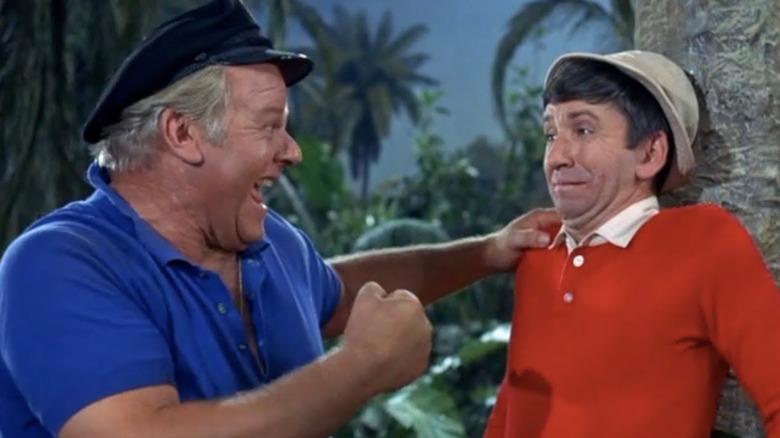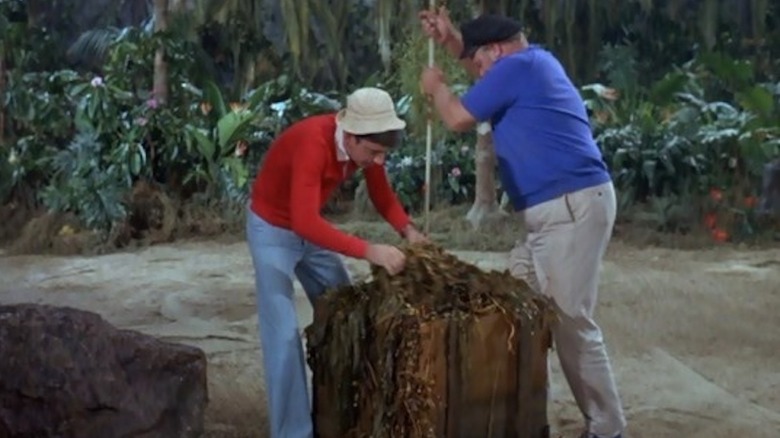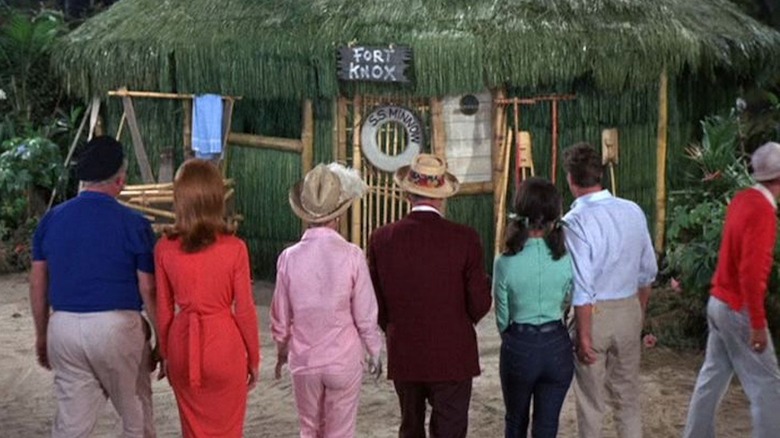The Creator Of Gilligan's Island Wrote The Pilot In Unimaginable Pain
The act of creation can be a difficult process. Painful even. Sometimes excruciating. Take, for instance, the writing of the "Gilligan's Island" pilot.
Sherwood Schwartz was no babe in the entertainment industry woods when he set out to bring the tale of the S.S. Minnow's two-man crew and five passengers getting shipwrecked on an uncharted island somewhere far off the coast of Hawaii. He broke into show business as a radio writer for The Bob Hope Show in 1938, and found additional work on the radio version of "The Adventures of Ozzie and Harriet." He segued to television in the 1950s when he joined the staff of the early sitcom "I Married Joan," put in six years on "The Red Skelton Show" and was ready to pitch a show of his own in 1963 when he hit upon the idea of a particularly calamitous three-hour boat tour.
"Gilligan's Island" may be one of the silliest sitcoms in the history of television, but Schwartz's Sartre-esque concept is still in the pop cultural conversation 60 years after its CBS network premiere. The series' formula ain't rocket science: every episode opens on the island, confronts the seven characters with a conundrum or two and ends with everyone still stranded on the island. Occasionally, a stroke of seeming good fortune arises that might return them to civilization, but these opportunities are always undone by the lovably inept Gilligan (Bob Denver).
The episodes often feel like they wrote themselves, but writing the episode that lands Gilligan and the gang on the island proved an unexpectedly Herculean task for the Schwartz. And this is because the veteran comedy writer disastrously mistook himself for a wood-lugging Hercules.
The eucalyptus tree that nearly wiped out Gilligan's Island
In his 1994 memoir "Inside Gilligan's Island," Schwartz describes in admirably good-humored detail how his stubborn determination to be handy around the house left him in debilitating pain throughout the writing of the series' pilot. The tale begins with workers noisily sawing down a massive eucalyptus tree in his backyard, thus distracting Schwartz from banging out the script that would launch 98 oddly memorable episodes.
The trouble started when the men finished their task and asked Schwartz if he'd like them to chop up the felled eucalyptus into firewood. Recalling that eucalyptus logs are pleasantly fragrant when aflame, Schwartz, eager to turn the briefly aggravating experience into a positive, accepted their offer.
One Saturday, Schwartz was about to sit down and work on the pilot when he spotted storm clouds in the near distance. Worried about the eucalyptus logs getting soaked and rendered unusable, he stalked out to his backyard to haul the lumber into his garage. Alas, upon picking up the first log, the writer realized he was in for a grueling test of strength. Per Schwartz:
"My knees buckled. I couldn't believe a three-foot section of eucalyptus weighed that much.
I had bought a lot of firewood over the years, but I never had any trouble lifting it. It never occurred to me that the firewood I bought had been cured for many months, maybe years. This eucalyptus wood was fresh, full of water and sap."
After struggling mightily to lug the first two logs back to his garage, Schwartz probably should've put a wheelbarrow to use. Instead, he strode back out for log number three, which proved to be a Gilligan-level folly.
It's not as bad as childbirth
Undeterred by the staggering weight of the eucalyptus logs, Schwartz bent over to hoist the third log off the ground. As Schwartz wrote in his memoir, "That's how I remained! Bent over, with my hands down by my ankles! I couldn't move. I was in such agony I couldn't even breathe. I was frozen."
Schwartz immediately called out to his wife Mildred for help. The ensuing exchange would've been right at home in one of the writer's sitcom scripts:
"Mildred came to the back door and saw me out in the yard bent over like a horseshoe. She called to me, 'What are you looking for?'
'Nothing,' I said, as loudly as I could. 'I can't move.' 'What do you mean, you can't move,' called Mildred.
'I can't move. I'm in such pain, I can't even breathe.'
Mildred was properly sympathetic. 'It's not as bad as childbirth,' she pointed out."
Schwartz remained fixed in his horseshoe shape until Mildred was able to find an available doctor to tend to the writer's painfully immobilized condition. Though she had to back their car up to the backyard to load Schwartz into the car, she eventually got him to the doctor, who gave him a shot to relieve the spasm in his back. Unfortunately, Schwartz had also damaged one of his discs, which laid him up for a while.
Was it worth it? According to Schwartz, "For several weeks I remained in great pain, but continued the development of 'Gilligan's Island.' That's another advantage of being a writer. Even though you're in great pain, you can still work seven days a week."
Schwartz suffered for his art, and thank god he did. The world would be marooned in a far less wondrous place had we never spent three seasons hanging with Gilligan, the Skipper, the Howells, Ginger, the Professor and Mary Ann.


